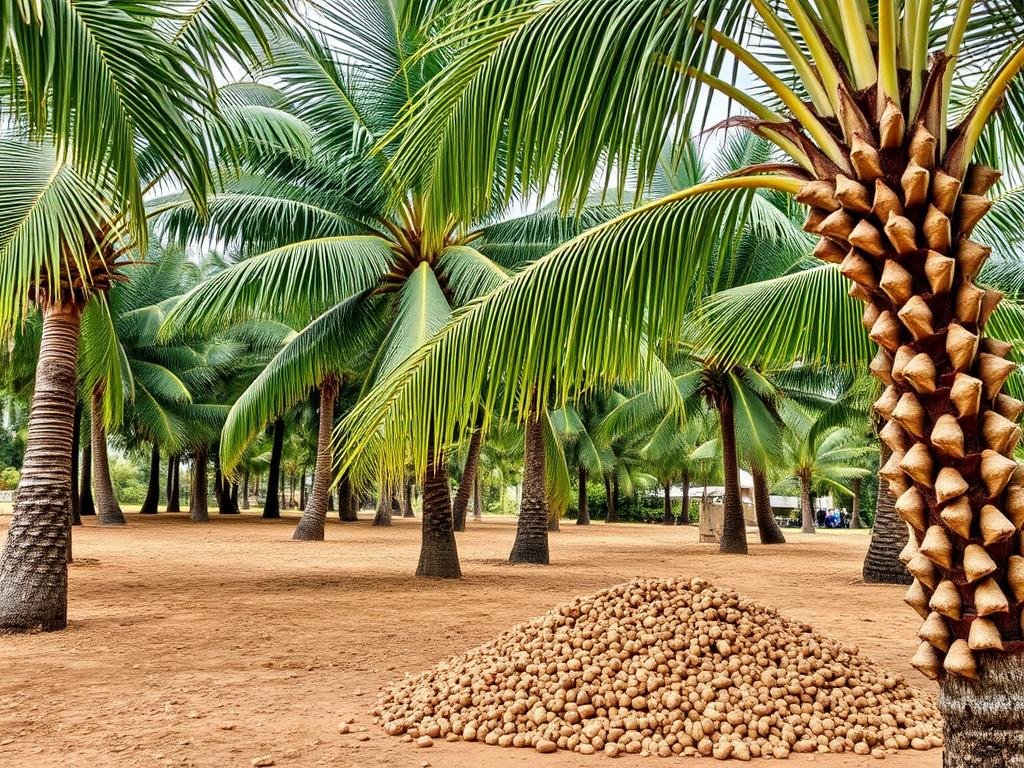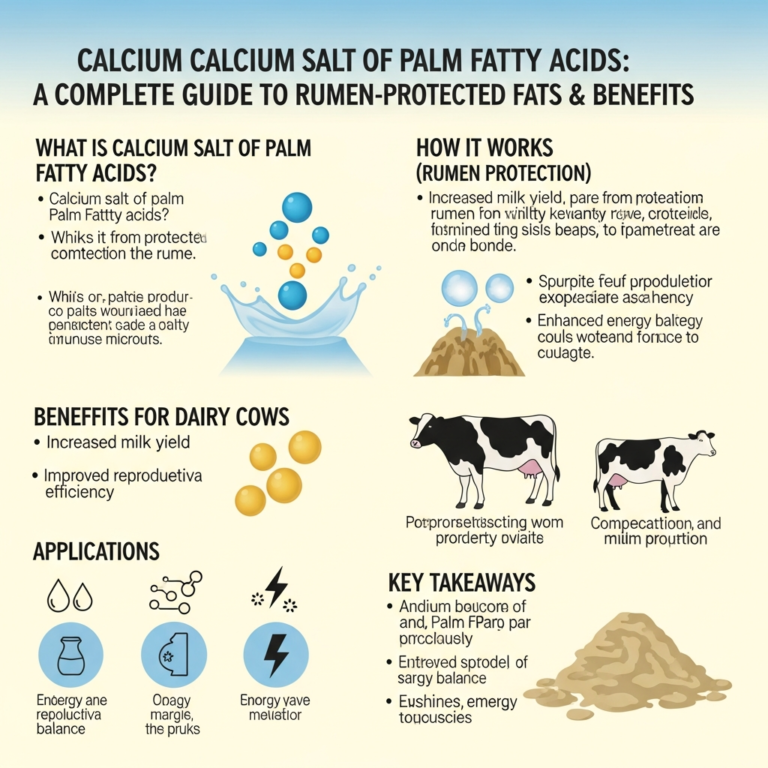Table of Contents
Finding trustworthy palm kernel expeller suppliers is one of the biggest challenges for businesses in the animal feed industry. The journey of this crucial ingredient begins with the Oil Palm Fruit Bunch, from which the kernels are extracted. With global demand for high-protein feed on the rise, ensuring a consistent supply of high-quality Palm Kernel Expeller (PKE) is paramount. A weak link in your supply chain can lead to production delays, financial loss, and compromised livestock health. This guide provides a proven 5-step framework to help you vet and select the best exporters for your needs.
The global market is filled with options, but not all suppliers are created equal. Due diligence is not just a recommendation; it’s a necessity. This article will walk you through how to identify and partner with reliable PKE exporters who can deliver on their promises of quality, consistency, and professionalism.
Why Vetting Palm Kernel Expeller Suppliers is Crucial
Before diving into the “how,” it’s important to understand the “why.” PKE is a high-protein byproduct derived from crushing the Palm Kernel during the extraction of Palm Kernel Oil. The quality of PKE directly impacts the health and productivity of livestock. Low-quality PKE can contain high levels of aflatoxins, which are toxic compounds produced by certain molds. This can lead to poor animal performance, illness, and even death, posing a significant risk to your operations.
Furthermore, unreliable suppliers can cause severe disruptions. The wider palm oil industry, which produces everything from Crude Palm Oil to other valuable byproducts like Palm Kernel Shell for biofuel, relies on stable supply chains. Imagine placing a large PKE order only to face shipment delays or incorrect documentation. These issues halt your production and can damage your business’s reputation. Thoroughly vetting potential exporters is your primary defense against these risks.
[IMAGE SUGGESTION: An image showing bags of high-quality palm kernel expeller stacked neatly in a clean warehouse or being loaded for export.]

The Ultimate 5-Step Guide to Vetting Reliable PKE Suppliers
Follow this structured approach to systematically evaluate potential PKE exporters and build a resilient supply chain for your business in 2025.
Step 1: Comprehensive Background and Reputation Check
The first step is to investigate the supplier’s background. Start by verifying their business registration and operational history. A legitimate company should have a physical address, a local business license, and an export license. Be wary of suppliers who only provide a P.O. box or are hesitant to share registration details.
Next, search for online reviews, testimonials, and case studies. Check industry forums, trade portals like Global Sources, and social media platforms like LinkedIn. See what other buyers are saying about their experience. A long-standing, positive reputation is a strong indicator of a reliable partner among the many PKE companies available.
Step 2: Verify Certifications and Quality Standards
Certifications are a formal testament to a supplier’s commitment to quality and safety. For animal feed ingredients, one of the most important certifications is GMP+ (Good Manufacturing Practices). This certification ensures that the supplier adheres to strict international standards for feed safety.
Additionally, inquire about their commitment to sustainability. With growing consumer awareness, sourcing from suppliers who are members of the Roundtable on Sustainable Palm Oil (RSPO) can be a significant advantage. Ask for copies of these certificates and verify their authenticity directly with the issuing body. Reputable exporters will be transparent about their certifications.
Step 3: Request and Analyze Product Samples & COA
Never commit to a large order without first evaluating the product yourself. Request a recent sample of their PKE and a corresponding Certificate of Analysis (COA). The COA is a critical document that details the product’s specifications, including:
- Crude Protein (typically 14-18%)
- Crude Fat (8-12%)
- Crude Fiber (15-20%)
- Moisture Content (below 12%)
- Aflatoxin Levels (must be within your country’s legal limits)
For ultimate assurance, send the sample to an independent, third-party laboratory like SGS or Intertek for verification. While this adds a small cost, it can save you from a disastrously poor-quality shipment later on. This step is a non-negotiable part of vetting any serious PKE supplier.
[VIDEO SUGGESTION: A short, animated video explaining how to read a Certificate of Analysis (COA) for PKE.]
Step 4: Evaluate Logistics and Supply Chain Capability
A supplier’s ability to deliver your product on time and in good condition is just as important as the product quality itself. Inquire about their logistics experience, especially with shipping to your country. Ask about their packaging methods (e.g., 50kg bags, bulk in containers) and how they ensure minimal product degradation during transit.
Discuss shipping terms (Incoterms) clearly. Whether it’s FOB (Free on Board) or CIF (Cost, Insurance, and Freight), understanding your responsibilities versus the supplier’s is crucial. You can learn more about these terms from the International Chamber of Commerce. A competent supplier will have a streamlined process for handling documentation, including the Bill of Lading, Certificate of Origin, and phytosanitary certificates.
Step 5: Communication and Contract Negotiation
Throughout the vetting process, pay close attention to the supplier’s communication. Are they responsive, professional, and transparent? Clear and timely communication is often a reflection of their overall business practices. If they are difficult to reach or evasive with answers, consider it a major red flag.
Once you are satisfied with the previous steps, proceed to contract negotiation. The contract should be comprehensive, covering quality specifications, pricing, payment terms (e.g., Letter of Credit), delivery schedules, and clauses for dispute resolution. Having a legally sound contract protects both you and the supplier, forming the foundation of a long-term professional relationship. This final step solidifies your partnership with your chosen PKE partner.
Red Flags to Watch Out For When Choosing a PKE Supplier
As you evaluate potential partners, be vigilant for these warning signs:
- Prices Too Good to Be True: Extremely low prices often indicate a compromise on quality, or it could be a scam.
- Lack of Transparency: Hesitation to provide documents, certificates, or a physical address.
- Poor Communication: Slow response times, unprofessional language, or unwillingness to answer questions clearly.
- No Verifiable History: Inability to provide trade references or evidence of past shipments.
- Pressure for Upfront Payment: Pushing for 100% upfront payment via wire transfer, especially without a secure method like an L/C.
Understanding the benefits of PKE in cattle feed makes it even more important to source a high-quality product, so avoiding these red flags is critical.
Conclusion: Forging a Strong Partnership
Selecting the right partner is a strategic decision that directly impacts your operational success and profitability. By following this 5-step vetting guide, you can confidently navigate the market and distinguish the professional, reliable palm kernel expeller suppliers from the rest. Remember that due diligence is an ongoing process, and building a strong, transparent, and long-term relationship with your supplier is the ultimate goal.
Ready to partner with a supplier that meets all these criteria? Makmur Amanah Sejahtera is a leading Indonesian exporter of high-quality palm products. Our commitment to quality, transparency, and reliable logistics makes us the ideal partner for your business. We provide premium Palm Kernel Expeller, along with other key commodities like Palm Kernel Shell for biomass and Crude Palm Oil. Contact us today via WhatsApp at +6282140002198 or email us at admin@makmuramanah.co.id to request a quote and a product sample!


